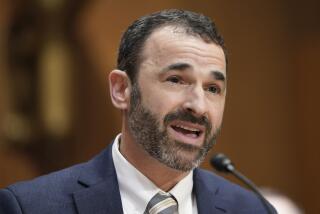IRS apologizes for seizing bank accounts of small businesses
- Share via
Pressured by Congress, the IRS said Wednesday that it is changing its policies and apologizing for seizing bank accounts from otherwise law-abiding business owners simply because they structured bank transactions to avoid federal reporting requirements.
Their alleged crime: routinely making bank deposits of less than $10,000. That allowed the business owners to avoid reporting requirements designed to catch drug dealers and money launderers.
IRS Commissioner John Koskinen told Congress that the IRS is changing policies to prevent the seizures, as long as the money came from legal means.
“To anyone who is not treated fairly under the code, I apologize,” Koskinen told the House Ways and Means oversight subcommittee. “Taxpayers have to be comfortable that they will be treated fairly.”
By law, bank transactions above $10,000 must be reported to the IRS. It’s a felony, called “structuring,” to manage transactions to avoid the reporting requirement, even if the money is legally earned.
In some cases, the IRS seized and held bank accounts for years without bringing charges.
Koskinen said he didn’t know how many cases the new policy would affect. He said the IRS seized a total of 147 accounts last year, including those in which the money was illegally obtained.
“On average over the last several years, it’s less than 200 cases,” Koskinen said. “In 60% of those cases, the owner of the asset never shows up, which shows that they obviously had a criminal activity going on.”
The Treasury inspector general for tax administration is launching an audit of the IRS’ seizure program, said Rep. Peter Roskam (R-Ill.) chairman of the Ways and Means oversight subcommittee. It is unclear how long the probe will take.
Roskam said the IRS has too much power to seize assets, even if the agency doesn’t have adequate evidence of a crime.
“The IRS doesn’t have to give notice to the account holder before seizing the assets. And the IRS doesn’t have to prove that the person is actually guilty of anything — just that the account probably is involved in structuring,” Roskam said.
Georgia gun shop owner Andrew Clyde said he didn’t know about the reporting law when he got an insurance policy that only covered losses up to $10,000 if they happened outside his store in Athens.
Clyde and three other business owners appeared before Roskam’s subcommittee Wednesday to recount how the IRS had seized their bank accounts.
Because of his insurance policy, Clyde said, he didn’t like carrying more than $10,000 in cash between his store and the bank.
As a result, Clyde said, he made 109 transactions between May 2012 and March 2013, totaling $940,313. A month later, he said, he was visited by two IRS agents who accused him of structuring those deposits to avoid the reporting law. They said the account had been seized.
“I was never so afraid in my life,” said Clyde,” a former Marine who did three tours in Iraq. “I trembled when they left.”
Clyde said he was never accused of evading taxes or of illegally obtaining the money. Yet, he said, the IRS filed a civil complaint against him and made several offers to settle the case by forcing him to forfeit large portions of his money.
In August, three days before the scheduled start of a civil trial initiated by the IRS, Clyde agreed to forfeit $50,000 in order to get the rest of his money back. Clyde said his legal bills totaled almost $150,000.
“This was my tactical retreat, so I could live to fight another day,” Clyde told the subcommittee. “And that day is today.”
More to Read
Inside the business of entertainment
The Wide Shot brings you news, analysis and insights on everything from streaming wars to production — and what it all means for the future.
You may occasionally receive promotional content from the Los Angeles Times.










